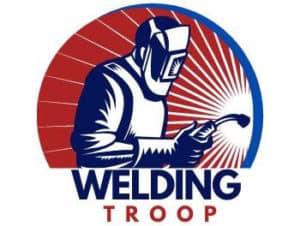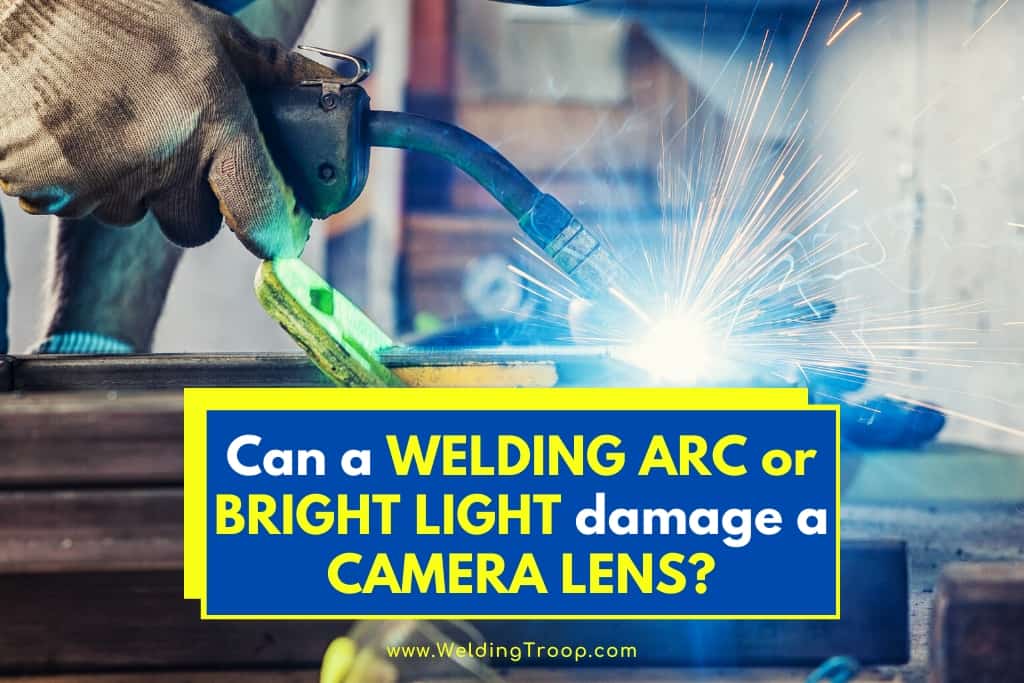Arc welding can be a dangerous activity if proper precautions are not taken, especially with eyewear. Due to the strain and damage a welding arc can cause to an eye, people often wonder if a welding arc can damage a camera lens. While researching this for my own filmmaking, I wrote up this short guide for videoing or photographing welders at work.
Can a welding arc or bright light damage a camera lens? The short answer is no. Cameras do not pick up on the ultraviolet light that actually causes eye damage from welding arcs or other bright surfaces.
While a welding arc is safe for a camera to capture most of the time, some preparations should be taken to ensure good quality footage and the long term health of the camera.
Table of Contents
How To Protect Your Camera While Filming Arc Welding
Although the act of arc welding will not damage a camera, the environments and equipment around the welding often can pose a small threat. Due to the nature of workshops, it is highly possible that pieces of metal or flashes of heat can extend out to where the camera sits.
Taking a large number of precautions while filming arc welding can ensure the health of the camera and camera operator. To protect the camera, lens filters are a great choice. To protect the camera operator, some safety equipment should be around.
Lens Filters
Lens filters are great for providing a small amount of extra care and protection to expensive camera lenses. Essentially, lens filters are smaller pieces of glass that attach to the end of a lens and often change the light spectrum slightly.
They are a versatile tool to have in any film kit and can change the mood of a scene dramatically. The two lens filters that would prove most useful when filming welding are clear filters or UV filters.
Clear filters are self-explanatory. They are just an additional piece of removable glass with no light-changing properties that sits at the end of the lens. For welding, they are useful for protecting the camera and its sensor against any splatter of material or sudden light spots that could occur.
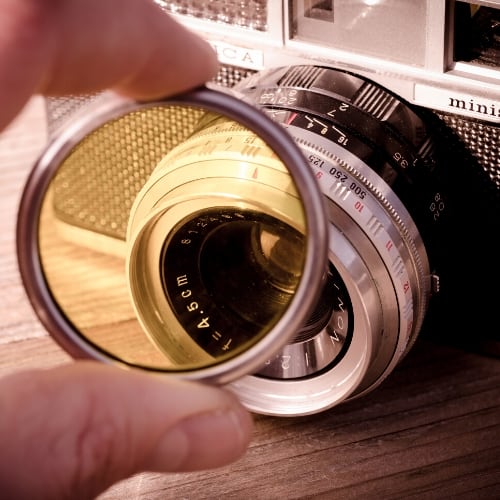
UV filters are basically sunglasses for a camera lens. As stated previously, UV light will not be captured in a camera, so this is not a safety concern. Still, due to the incredible amount of light that is given off during welding, over-exposure of shots can be a common issue. These filters will provide the same protection as a clear filter while also under-exposing the shot, possibly balancing the take so less editing needs to occur later.
While certainly not essential, lens filters will certainly help protect your camera lens if something ever went wrong.
3 Camera Lens Filters you Need to have >> Check out the video below
Camera Operator Safety Equipment
Although the camera will not pick up on the dangers of arc welding, someone has to be there to operate it! The camera operator is inherently in a dangerous position and should take steps to protect themselves even if they never plan on looking at the arc welding. This protection can come in a few ways, so choosing what works best for your shoot is important. Toward that end, here are a few ways to protect the camera operator:
- A full camera cover
- Protective eyewear
- A welding mask
- Smocks or gloves
All of these will certainly not be necessary on every shoot but each of them could prove useful under the right circumstances.
A full camera cover is useful for shielding the camera operator from any stray glances at a welding arc while they are actively working. This could be overkill for some shoots, as a camera operator will rarely look away from the camera, but could be useful if scenes will be long.
UV protective eyewear is essential when filming arc welding. While not as protective as a welding mask, UV protective eyewear will help stop camera operators from getting hurt if they accidentally look at the arc weld. They are also easy to gather and have around, making them an easy and great piece of gear for welding projects.
Welding masks and smocks and gloves are great for protecting the camera operator’s body, but almost certainly overkill on most shoots. These are only essential when the camera needs to be incredibly close to the work being done, which should be avoided anyway. Still, when circumstances call for it, nothing else will protect you more from any welding.
What Is Welder’s Flash?
Welder’s flash, or arc eye as it is occasionally known, is the painful damage caused to eyes by arc welding when proper safety steps are not taken. Cameras and televisions are not subject to this, thankfully, but it is still important to be aware of this condition when working around welding.
Welder’s flash is, at a basic level, the burning or inflammation of the cornea, or the front of the eye. This happens from exposure to UV light, such as from welding arcs or looking at the sun. When left alone, it can cause serious loss of vision after incredible pain.
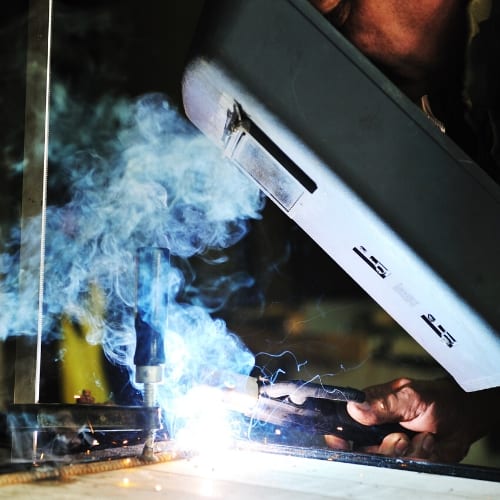
Some of the symptoms of welder’s flash include:
- Pain in the eye
- Light sensitivity, ranging from mild to extreme
- Bloodshot eyes
- Blurred and watery vision
- The feeling of having something in your eye
As you can see from the symptoms, arc eye can cause harsh symptoms and should be avoided at all costs. Still, the eye can often repair itself without any lasting damage if the burn is treated. If you think you have flash burn, it is important to talk to a doctor and get a diagnosis.
Learn More About Welder´s flash – Here, you can find an article from our website about: How Long Does Welders Flash Burn Last? Symptoms and Treatments
Common treatments for welder’s flash include:
- Eye drops
- Padded dressing and eye patches
- Antibiotics, if an infection has occurred
- Pain relief medication, especially early in the process
All of these should only be used when consulted on by a doctor in addition to a checkup and official diagnosis.
Welder’s flash is a dangerous side effect of welding and one that should be avoided at all costs even when just filming arc welding. Thankfully you cannot get the burn through television or through a camera lens, but it is important to arm yourself with protective equipment when actively filming.
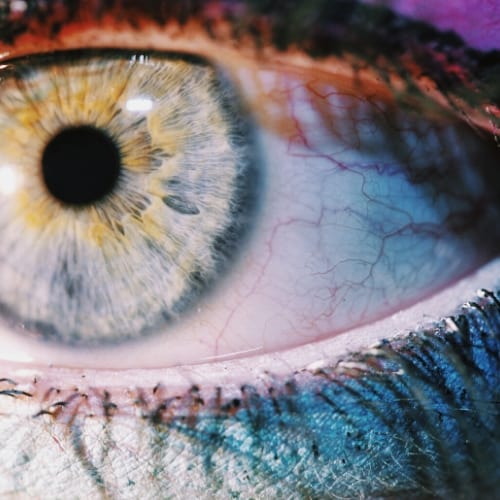
Is It Safe To Watch Welding on TV?
Welding can be watched safely on television. Although watching welding in real life without proper protection can cause serious issues such as welder’s flash, watching on TV is just fine.
Cameras do not pick up on ultraviolet light, which is actually what causes issues to develop when viewing welding. This is similar to looking directly at the sun; although dangerous in real life, if viewed through a screen and filtered no damage will occur.
Even if cameras could pick up on the intense light that actually causes issues, television screens are simply not powerful enough to emit a strong enough level of light to cause harm.
Visible Light VS Invisible Light
As stated previously, almost all damage caused by arc welding is through ultraviolet light, with a small amount also coming from radiation. Ultraviolet light is not visible to the human eye or cameras unless highly specialized equipment is used.
There is a large range of invisible light and radiation that the equipment used in television simply cannot pick up on. It may be helpful to think of watching arc welding on television as looking at a video of the sun. What is captured is only visible light.
Visible light almost never causes actual harm to the eyes or to equipment. The largest effect visible light will have on watching welding on TV is some harmless over-exposure of the shot.
Armed with this knowledge and the safety of screens, go forward and watch videos of welding whenever you want!
Recommended Reading
How Long Does Welders Flash Burn Last? Symptoms and Treatments
Can You Look at the Sun or Eclipse with a Welding Helmet? Is It Dangerous?
